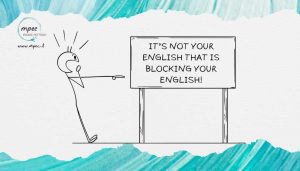Being funny in a second language can be quite an adventure! In this article, we will explore the challenges you might encounter and see in practice how native speakers deal with them in communication.
Written with love by: Suzanne Pilch, ICF Certified Coach & MPEC Partner
Laughter is a universal language that transcends borders and cultures, and one of its most fundamental components is wordplay. Puns, double entendres, and other playful manipulations of language have long been cherished tools in the arsenal of humorists. In the realm of English language comedy, wordplay takes on a special significance, as the language’s rich vocabulary and flexible syntax provide ample opportunities for linguistic mischief.
From the clever witticisms of Oscar Wilde to the zany wordplay of comedians like Groucho Marx, the English language has witnessed an enduring love affair with puns and play on words.
In this article, we delve into the fascinating world of wordplay, exploring how it functions as the very building blocks of humour in English.
What will we look at today?
Firstly, we will examine the definition and mechanics of puns, the quintessential form of wordplay. Puns involve the humorous exploitation of words or phrases that sound similar but have different meanings, often resulting in unexpected and amusing twists. We will explore the various types of puns, ranging from homophonic puns to clever linguistic juxtapositions, and analyze their effectiveness in generating laughter.
Furthermore, we will explore how play on words extends beyond puns, encompassing a broader array of linguistic techniques. This includes witty one-liners, clever word associations, and the employment of idiomatic expressions in unexpected contexts. By examining notable examples from literature, comedy sketches, and everyday conversations, we will uncover the versatility of wordplay and its ability to entertain, surprise, and evoke laughter.
In the realm of English language comedy, puns and play on words serve as the foundation of countless jokes, sketches, and comedic masterpieces. As we embark on this exploration of the building blocks of humor in English, prepare to be tickled by linguistic acrobatics and discover the delightful intricacies that lie within the realm of wordplay.
Humour often relies on puns and play on words to create a comedic effect. These linguistic techniques involve using words that sound similar or have multiple meanings to create clever and amusing connections.
Let’s begin!
Puns: What even are they?
Puns, the quintessential form of wordplay, are a fascinating linguistic device that infuses humor into the English language. At their core, puns are characterized by the humorous exploitation of words or phrases that possess similar sounds but divergent meanings. This clever manipulation of language allows for unexpected and amusing twists that tickle our funny bones.
One type of pun commonly encountered is the homophonic pun. Homophonic puns rely on words that have the same or similar pronunciation but differ in meaning. This play on words often involves substituting one word for another, capitalizing on the auditory similarity to create a humorous effect. For instance, the classic pun, “Time flies like an arrow; fruit flies like a banana,” showcases the playful ambiguity between the verb “flies” (indicating movement) and the noun “flies” (referring to the insect).
In addition to homophonic puns, puns can also take the form of clever linguistic juxtapositions. These types of puns exploit the multiple meanings of a single word or phrase by cleverly incorporating it into a sentence or context where it produces a humorous or unexpected outcome. This wordplay relies on the audience’s ability to recognize the different meanings and appreciate the witty connection. For example, consider the pun, “I used to be a baker, but I couldn’t make enough dough.” Here, the word “dough” is used in its literal sense of bread-making ingredients, but also carries the figurative meaning of money, resulting in a humorous play on words.
The effectiveness of puns in generating laughter lies in their ability to surprise and engage the audience’s linguistic sensibilities. Puns provide a delightful mental exercise as we navigate the interplay between words and meanings, leading to a moment of realization and amusement. They can be found in various forms of creative expression, from literature and poetry to stand-up comedy and advertising campaigns. By examining the mechanics and diversity of puns, we gain a deeper appreciation for their role as powerful tools in the comedian’s arsenal, consistently generating laughter and brightening our linguistic landscape.
“I used to be a baker, but I couldn’t make enough dough. So I kneaded some more.”
In this pun, the word “dough” has a double meaning. It refers to both the money earned and the mixture used in baking. The play on words with “kneaded” (a process in baking) adds to the humour.
“I’m reading a book about anti-gravity. It’s impossible to put down!”
Here, the pun relies on the double meaning of “put down.” Normally, it means to place something down, but in this context, it also refers to the difficulty of stopping reading the book due to its captivating content.
Play On Words
Beyond puns, wordplay encompasses a wide range of linguistic techniques that contribute to the humour in English. These techniques include witty one-liners, clever word associations, and the creative use of idiomatic expressions in unexpected contexts. By venturing into the realms of literature, comedy sketches, and everyday conversations, we can unravel the versatility of wordplay and appreciate its ability to entertain, surprise, and evoke laughter.
Witty one-liners are concise and clever statements that rely on wordplay to deliver a punchline. These short and snappy jokes often hinge on clever word choices, double meanings, or unexpected twists. Comedians and writers skillfully craft these one-liners to provoke quick bursts of laughter. For example, the legendary comedian Groucho Marx once quipped, “I never forget a face, but in your case, I’ll make an exception.” This play on the double meaning of “make an exception” creates a humorous paradox, demonstrating the power of a well-crafted one-liner.
Clever word associations are another facet of wordplay that exploit the connections between words to create humorous effects.
Additionally, the use of idiomatic expressions in unexpected contexts is a delightful form of wordplay that surprises and amuses. Idioms are commonly used phrases with figurative meanings that differ from their literal interpretations. When idioms are creatively employed in unconventional ways, it creates a humorous twist. For instance, imagine someone saying, “I’m feeling like a fish out of water in this fancy restaurant, and I’m not even on the menu!” This playful manipulation of the idiom “fish out of water” adds an unexpected comedic element, generating laughter through the clever use of language.
Ricky Gervais, known for his dry wit and sharp observational humour, has a knack for twisting idiomatic expressions for comedic effect. In one of his stand-up routines, he humorously plays with the idiom “take it with a grain of salt” by saying, “I take everything with a pinch of heroin. Makes life more interesting!” This unexpected and exaggerated substitution of “salt” with “heroin” creates a humorous contrast and subverts the audience’s expectations, eliciting laughter through the clever reimagining of the idiom.
Similarly, Kevin Hart, a master of storytelling and comedic improvisation, often employs wordplay and idiomatic expressions to create humorous scenarios. In one of his routines, he jokes about his fear of encountering a bear while hiking and says, “If I see a bear, I’m playing dead…dead like you owe me money!” Here, Hart ingeniously modifies the idiom “dead as a doornail” to “dead like you owe me money,” infusing it with a personal and humorous twist that showcases his comedic style.
#HumorInEnglish #LearningEnglishWithHumor #EnglishLanguageHumor #LaughAndLearnEnglish #HumorousLanguageLearning #FunnyEnglishLessons #ComedyInLanguageLearning #LanguageLearningThroughHumor #WordplayAndEnglishLearning #FunnyLanguageExpressions #LaughYourWayToEnglish #HumorBoostsEnglishSkills #EngagingEnglishThroughHumor #HumorouslyLearningEnglish #JokesAndEnglishLearning #FunnyLanguageTips #EntertainingEnglishEducation #LinguisticLaughter #ComedicApproachToEnglishLearning #LaughWhileYouLearnEnglish #HumorDrivenLanguage #LateNightShows #ComedyShows #StandupComedy #ComedyCentral #LateNightHumor #LateNightEntertainment #FunnyTalkShows #ComedicGenius #LateNightLaughs #ComedySketches #ComedyMonologues #ComedyRoutines #ComedySpecials #LaughOutLoud #HumorAndEntertainment #FunnyMoments #ComedyClub #ComedyScene #ComedyIndustry #ComedyCommunity #JokesAndLaughs #grouchomarx





